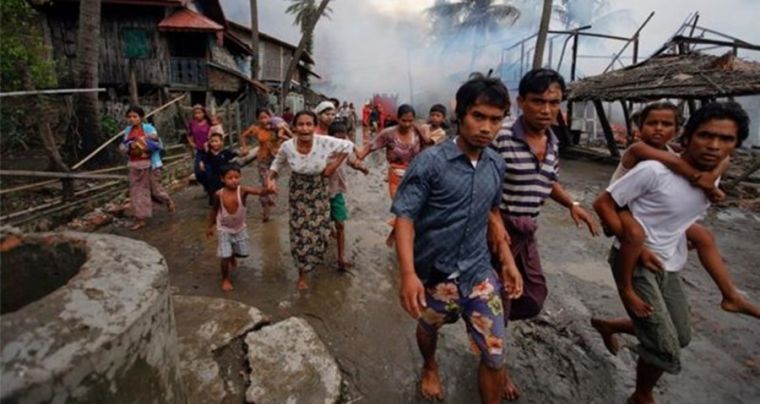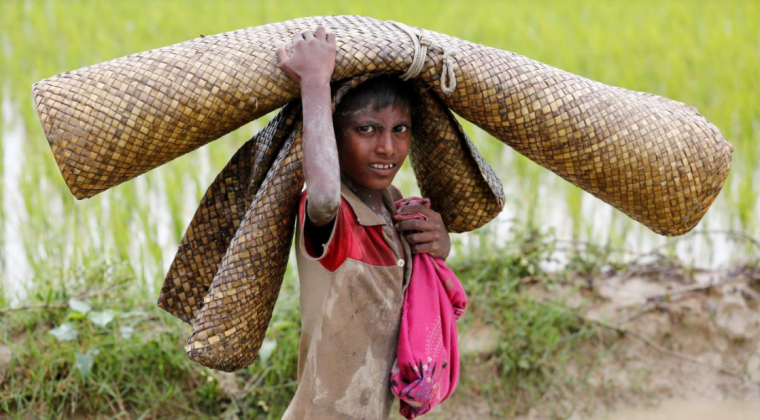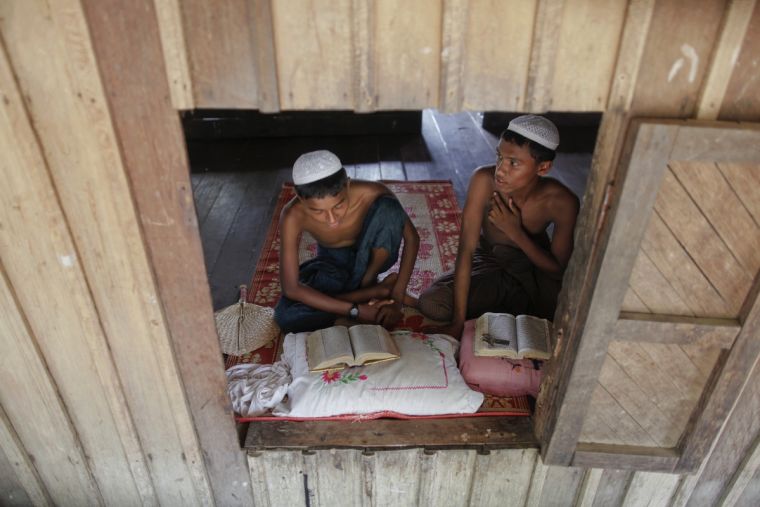Myanmar's rapes, beheadings and beatings: How the regime's persecution of the Rohingya minority is escalating
Myanmar's blocking of vital aid to thousands of desperate civilians fleeing persecution is the latest in a countless number of atrocities committed against the Rohingya.
Considered the most persecuted people group in the world, more than 80,000 have fled Myanmar into Bangladesh since the latest outburst of fighting began just over a week ago.

Satellite pictures released by Human Rights Watch (HRW) show entire villages burnt to the ground with 700 homes destroyed in one area alone. Video footage shows children being beheaded and women and children beaten. Those who survived to escape tell of horrific 'massacres'.
Hamida Begum, a refugee who has left everything behind, told CNN: 'They are beating us, shooting at us and hacking our people to death.
'Many people were killed. Many women were raped and killed. We are very poor.'
Aid workers in refugee camps on the Bangladesh side of the border say they can't take any more in and the UN's humanitarian outfit is being blocked from reaching thousands more, trapped in forests and hills on the Myanmar side of the border.
As tens of thousands, many with bullet wounds, continue to flee into Bangladesh despite orders from the Bangladeshi government to stop them, the latest surge in persecution against the Rohingya is causing particular worry.
Similar violence less than a year ago saw 85,000 Rohingya flee across the border into Bangladesh bringing accounts of mass rape, torture and murder from inside their own Rakhine State.

And since 2012 100,000 have lived in refugee camps within Myanmar after clashes between Buddhist nationalists and Muslims forced them from their homes. Along with hundreds of thousands of others, they also stopped receiving crucial aid last week.
Humanitarian organisations are 'deeply concerned about the fate of thousands of people affected by the ongoing violence' in northern Rakhine, said Pierre Peron, spokesman for the UN Office for the Coordination of Humanitarian Affairs (OCHA) in Myanmar.
'There is an urgent need to ensure that displaced people and other civilians affected by the violence are protected and are given safe access to humanitarian assistance including food, water, shelter, and health services,' he added.
'Humanitarian aid normally goes to these vulnerable people for a very good reason, because they depend on it,' he went on. 'For the sake of vulnerable people in all communities in Rakhine state, urgent measures must be taken to allow vital humanitarian activities to resume.'
But on top of the concerns about the mass loss of life amid accusations of genocide and ethnic cleansing is the acknowledgement the violence was prompted by an attack from the Rohinyga's newly formed Arakan Rohingya Salvation Army (ARSA).

Myanmar's 1.1 million Rohingyas have largely eschewed retaliation despite decades of persecution from the mainly Buddhist Myanmar military who do not recognise their place in the country. Stateless and refused citizenship, the Rohingya have suffered sustained attempts at ethnic cleansing with the Myanmar government justifying the attacks by saying they are combating 'terrorism'.
The largely Islamic people group have been victims of anti-Muslim sentiment fuelled by Myanmar's Buddhist leaders.
But the formation of ARSA last year adds weight to the government's illegitimate claim the Rohingyas are terrorists. This latest wave of attacks was provoked by ARSA's attack on a Myanmar police outpost, killing nine.
While the response has been disproportionate and more than 400 have died already, the outbreak of increasingly frequent attacks from Rohingya militants is a worrying sign for any hoping for peace in the region.











